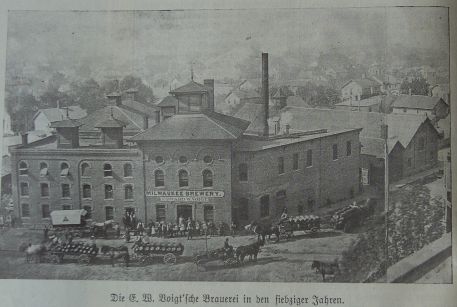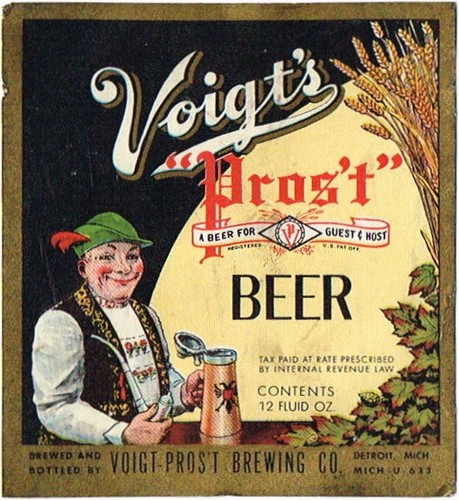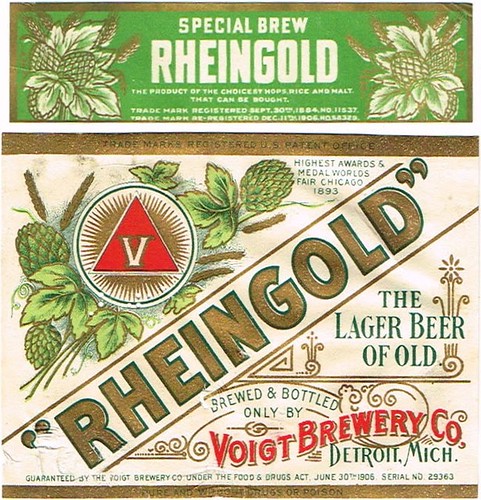
Today is the birthday of Edward W. Voigt (April 5, 1844-May 14, 1920). His father was a brewer who founded a brewery, and also trained his son, and sent him to brewing school. He worke din other breweries and in completely different businesses, but eventually worked with his father and ran the family brewery, the Voigt Brewery, in Detroit, Michigan.
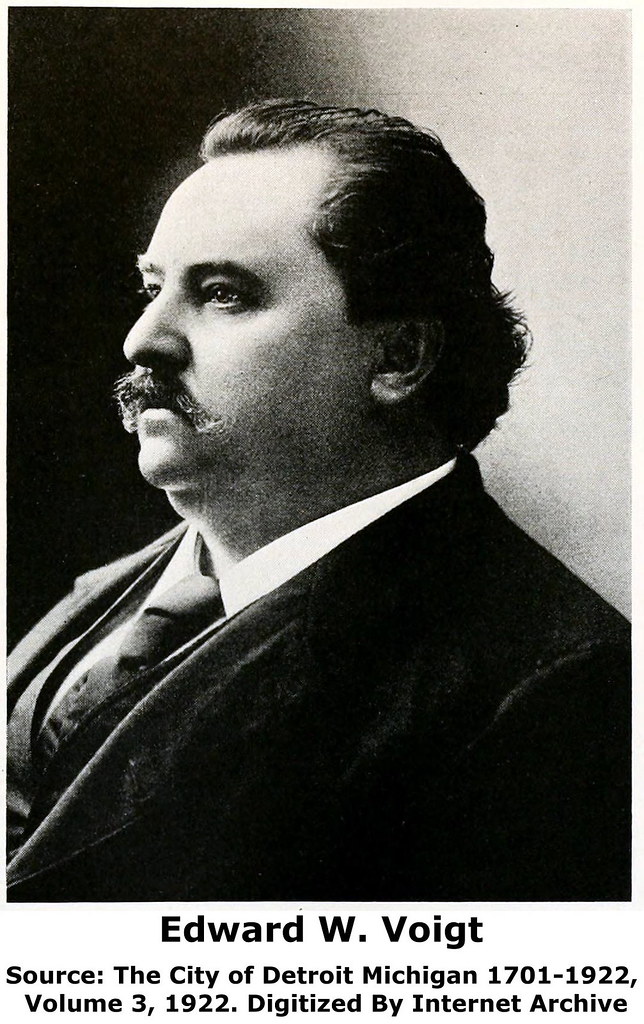
Here’s a thorough biography by Burton (though I confess I don’t know who Burton might be):
EDWARD W. VOIGT was an outstanding figure in connection with the development of Detroit, where for more than fifty-five years he was identified with the city’s business interests. Mr. Voigt was born in Daebeln, Saxony, Germany, April 5, 1844, a son of Carl William and Pauline (Beck) Voigt, the latter of whom died in Germany. The father married again in that country and with his wife and only son, Edward W., sailed from Hamburg for Liverpool, England, the latter part of May, 1854. At the latter port they embarked on the ship Malabar and reached New York on the 1st of August. An epidemic of cholera was then raging in New York and, moreover, the father was not in robust health as a result of conditions which he had experienced during the ocean voyage. It seemed better that they leave New York at once, which they did, and went to College Paint, Long Island. When the father had sufficiently recovered to travel they went west, stopping in Toledo, Chicago and Milwaukee, but remained in those cities only a short time, after which they journeyed an to Madison, Wisconsin. In the latter city Carl William Voigt established a small ale brewery, which was converted into a lager beer brewery in 1857, and this business he conducted until 1863, when he removed to Milwaukee, where he soon afterward purchased the schooner Columbian that plied the lakes between Chicago and Buffalo in the grain trade. In 1864 Carl William Voigt removed to Detroit, retaining his vessel interest until December, 1865, when he disposed of same. It was really his intention at this time to return to Germany, but rumors of the possibility of war between that country and France caused him to defer the trip. In 1866 he established a brewery in Detroit and continued to conduct this until 1871, when he leased the plant to his son, Edward W., and returned to Germany, where he engaged in the milling business until his death in that country in 1889. Edward W. Voigt was about ten years of age when his parents brought him to America. His first schooling was received in his native land and after coming to this country he attended the public schools of Madison, Wisconsin, also a business college and for one term was a student at the University of Wisconsin. He had from boyhood worked in his father’s brewery at different periods and early in life had acquired a practical knowledge of the business. In those days it was impossible to brew lager beer during the summer months owing to the lack of familiarity with the theory of refrigeration, so that during those periods of inactivity Edward W. Voigt was able to attend classes. When the weather became cooler, so that the manufacture of beer could be resumed, he again took his place as a brewer in his father’s plant.
After his father disposed of the brewery at Madison in the fall of 1863, Edward W. Voigt concluded he would go to California and try his fortune in that new country. He went by the Isthmus of Panama but on reaching San Francisco found that work as a brewer was difficult to secure. He could not afford to remain idle indefinitely, so shipped before the mast on the barkentine Monitor, plying between San Francisco and north Pacific coast cities. Wages were law and the work not the most desirable. In writing home to his Vol. II-3 parents he had mentioned the character of his employment and his father replied that if Edward W. Voigt wanted to be a sailor he should come back home, as the father had bought the schooner Columbian. Edward W. Voigt returned east, again by the Isthmus route, and took the position of second mate on his father’s schooner. This was during the latter part of 1864. During the winter of 1864-65 Edward W. Voigt studied navigation in Boston, thus equipping himself to command his father’s schooner, and during the season of 1865 he was captain of the vessel, which was sold in December, 1865.
The following year Edward W. Voigt entered the employ of his father in the brewery which the latter had established in Detroit and continued in that capacity until 1871. At this time his father decided to return to Germany, so that the brewery equipment was disposed of to the son, who rented the plant for a term of four years, later renewing the lease for five more years. This was a downright business transaction and the fact that the father and only child were the principals made no difference whatever in the terms of the deal. The son had practically no capital at all and the father was secured by chattel mortgage on the stock and equipment. This was Edward W. Voigt’s beginning in business for himself and at a time when competition was keen, as there were no less than thirty plants in the ale and lager beer line in Detroit, but he was young, energetic and a hustler. Under his management the business began to grow from the very start and before long he was on the rapid road to success, so that in 1882 he purchased outright the entire interest of his father. The high class product that he turned out soon became one of the most popular in the city and the capacity of his brewery grew from three thousand barrels annually to more than forty-three thousand barrels, which was then a larger production than that of any brewery in the state. Mr. Voigt continued the business as sole owner and under his personal management until 1889, when he sold out to an English syndicate, retaining, however, a substantial interest in the new organization. In 1895 he bought back the business and organized the Voigt Brewery Company, of which he became president, and remained as such until the business was closed out on May 1, 1918, as a result of prohibition. Subsequently the plant passed into the hands of the Voigt Beverage Company, which now owns the plant.
While Mr. Voigt was a most successful brewery operator and one of the most prominent men in that industry in Detroit, his activities in other lines were big and valuable factors in the city’s growth. As his business became profitable and his means began to accumulate, he invested in numerous projects that not only brought personal gain but great public benefit as well. He was one of the founders of the Edison Illuminating Company of Detroit in 1886, in which undertaking he was associated with James Scripps, George Peck, Simon J. Murphy and several others. This company had a capital of one hundred and fifty thousand dollars and for fifteen years Mr. Voigt was its vice president. It proved a profitable project from its inception and led to Mr. Voigt’s further connection with various public utilities. He helped in establishing branches of the Edison Illuminating Company at Grand Rapids, Jackson, Sault Ste. Marie and Petoskey, Michigan. Mr. Voigt was formerly the owner of a tract of about one hundred and fifty acres of land on Woodward avenue four miles from the city’s center that he operated as a farm for a number of years. Then as the city began to expand he developed the property into the Voigt Park subdivision, which was laid out in the ’90s. In connection with that project he donated the present Voigt Park to the city. He laid out Boston and Chicago boulevards, as well as Atkinson, Edison, Longfellow and Calvert avenues and Glynn Court, comprising some of the best residential property in the city. Years ago Mr. Voigt purchased what was then known as Moores Bay, a tract of land of about fourteen acres at the foot of Twenty-fourth street, which was covered by six feet of water. This was filled in to the harbor line after nearly forty years of effort and was transformed into a valuable property. In 1919 the same was condemned by the city for dockage purposes. He was an extensive owner of central property and his city realty included his residence on Second boulevard and Cass Park, which was completed in 1886 and was his home until his death. This fine old mansion was built in the days when every detail of material and construction was most carefully considered and everywhere gives evidence of the thorough manner in which such work was done. Mr. Voigt was also one of the founders of the Port Huron Sulphite & Paper Company, which was organized in 1888 and of which he was the president until his death. In 1898-1900 he built the North Western Electric Railway out Grand River road to Northville, Orchard Lake and Pontiac, which is a great feeder now to Detroit and is controlled by the Detroit United Railway. He was likewise the president of the bridge company that built the large bridge between Grosse Ile and Wyandotte in 1912. This bridge connected his large tract of valuable land with the mainland. He was also the president of the Miles Theatre Company. He readily recognized and utilized business opportunities and as the years passed by developed his interests to extensive proportions.
In April, 1871, Mr. Voigt was married to Miss Bertha Dramburg, of Detroit, and they became the parents of four children: Augusta L. and Pauline M., both living at home; Anna Elsa, who is now Mrs. Otto Reinvaldt, of Detroit, and has three daughters; and one son, William F., who married Miss Caroline Halloran, of Detroit, by whom he has a son, Edward W. (II), and two daughters. William F. Voigt, who is the second of the family, and Otto Reinvaldt, his son in-law, were far a number of years associated with the father in business, largely looking after the Voigt interests. Mrs. Bertha (Dramburg) Voigt died in 1890 and for his second wife Mr. Voigt married in 1892 Miss Marion Randall, of Detroit, who passed away in December, 1911. There were no children by this marriage.
Years ago Henry Ford was in the employ of Mr. Voigt for a period of nine years as chief engineer of the Edison Illuminating Company. After prohibition went into effect the Voigt Brewery Company ceased to operate, but the outside interests of Mr. Voigt were extensive and important and made full claim upon his time and energy. In early manhood Mr. Voigt was a democrat, but the party’s stand upon the subject of free trade made him change his allegiance to the republican party, of which he became a warm supporter. He belonged to the Harmonie Society, to the Elks lodge and to the New Grosse Ile Golf Club. Mr. Voigt was one of the original founders of the Detroit Museum of Art. His success came from his own efforts and for many years he was included among Detroit’s strong, substantial business men. He was an unusually well preserved man for one of his years and took a keen interest in everything that pertained to the civic welfare and advancement of Detroit. His contributions to the development of the city were of a most substantial character, making him one of the foremost business men of Michigan’s metropolis. His death occurred May 14, 1920.
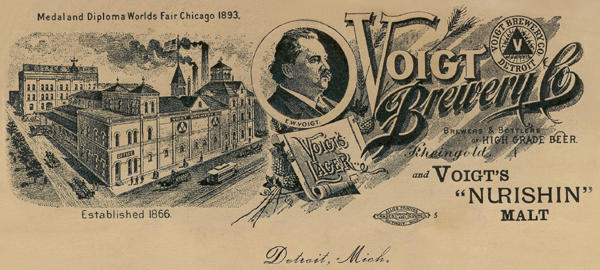
Telling the Stories of Detroit Parks also tells Voigt’s story:
As a landowner, he turned his 150 acre farm off Woodward into Voigt Park Subdivision in the 1890’s. We can thank him for Boston Boulevard, Chicago Boulevard as well as several of the surrounding streets west of Woodward.
Raised in Germany, he traveled to America with his folks Carl William and Pauline in 1854 on the trans-Atlantic ship, the Malabar. The trio crisscrossed the Midwest settling in Madison, Wisconsin where his father started the Capitol Steam Brewery. Edward began his education and attended the University of Wisconsin. He achieved the status of Brew Master at age 17. In 1864, the family brewery was sold to Carl Hausmann, a local WI ale competitor. William Voigt moved to Detroit to start a new brewery; his son Edward went on an adventure to California. The Detroit Voigt Brewery was built on Grand River at High Street [today this is around Grand River and I-75 area). Eventually, its 150 ft. chimney would grace the Detroit skyline.
Edward did an apprenticeship as a sailor and became captain of his father’s schooner – the Columbian; a short-lived adventure running the Great Lakes. Father and son would reunite in Detroit in 1871. Nothing was handed to Edward. He rented the Detroit brewery from his father who moved back to Europe. His energy and work ethic resulted in the ability to purchase the entire brewery operation from Carl in 1882. In 1893, his Rheingold beer earned 4 medals in the Chicago World’s Fair.
In 1889, British investors took great interest in purchasing or leasing American brewing facilities. Brewers such as the Stroh family and Anheuser Busch were vocally opposed to this practice. Edward Voigt negotiated the lease of his brewery for the period of 1890-1897. At the end of the contract, he received his business back but without a clean title. He enacted foreclosure proceedings to clear the title and stood in front of the old Detroit city hall to rebid on his business at auction. His creative business practices increased his fortune. He amassed extensive land holdings and was a principal founder of the Edison Illuminating Company which employed Henry Ford.
Around 1902, Voigt donated a rectangular parcel of land at 2nd and 3rd Avenues, Longfellow and Edison Avenues to the city on the condition it would be converted to a park and named for him.
Edward Voigt died at home on May 14, 1920 of a stroke. In 1922, the Voigt estate sold the brewery to a demolition firm who pulled down the chimney with a chain and a truck. The tumbling brick marked the end of Voigt reign in Detroit and the beginning of prohibition.
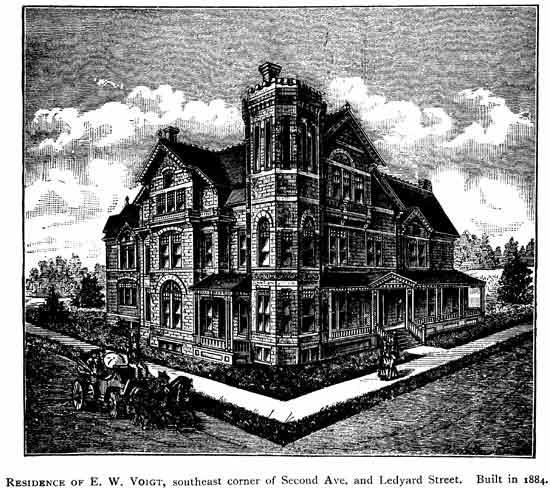
He was also very involved in the Grosse Ile Toll Bridge. There’s quite a bit more at Find a Grave, not for him, but for his first wife, Bertha Dramburg Voigt, who believe it or not was the family maid.

